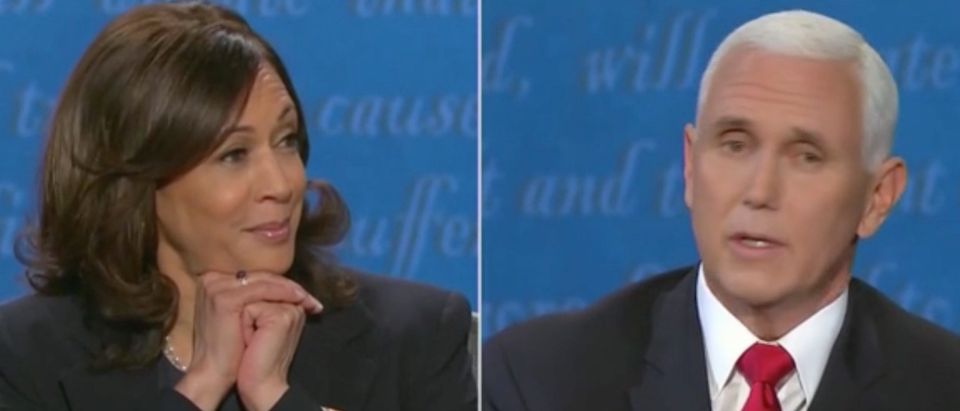Democratic vice presidential nominee Kamala Harris gave a “history lesson” during Wednesday night’s debate that turned out to be somewhat dubious.
After Vice President Mike Pence laid out the historical precedent for going ahead with Supreme Court nominations in election years, Harris claimed that President Abraham Lincoln had chosen not to go ahead with a nomination in 1864 because waiting until the people had spoken in the presidential election was “the right thing to do.”
WATCH:
Pence followed his recap of the history with a pointed question to Harris about whether or not she and former Vice President Joe Biden would support the plan — voiced by a number of Democrats — to pack the Supreme Court.
“You have refused to answer the question. Joe Biden has refused to answer the question. The American people would really like to know if Judge Amy Coney Barrett is confirmed to the Supreme Court of the United States, are you and Joe Biden, if you somehow win this election, going to pack the Supreme Court to get your way?” he asked. (RELATED: ‘Why Would She Tell Them Anything?’: Whoopi Goldberg Runs Defense For Kamala Harris’ Debate Night Dodges)
“I’m so glad we went through a little history lesson,” Harris replied, adding, “Let’s do that a little more. In 1864 — Mr. Vice President, I’m speaking. In 1864, one of the I think political heroes, I assume for you, also, Abraham Lincoln. He was up for reelection. It was 27 days before the election and a seat became open on the United States Supreme Court. Abraham Lincoln’s party was in charge not only of the White House, but the Senate. But Honest Abe said, ‘It’s not the right thing to do.'”
“The American people deserve to make the decision about who will be the next President of the United States, and then that person can select who will serve for a lifetime on the highest court of our land,” Harris concluded.
Presidential historian Michael Beschloss appeared to confirm Harris’ story, at least with regard to the timeline of events.
Harris is correct that when Roger Taney died in October 1864, Abraham Lincoln deferred a Supreme Court appointment until after election so that next President, with a new mandate, could do it.
— Michael Beschloss (@BeschlossDC) October 8, 2020
But while Harris was correct in stating that a Supreme Court seat was vacated 27 days prior to Lincoln’s reelection in 1864, others suggested that the reasoning she attributed to the 16th president for choosing not to nominate a replacement for Chief Justice Roger Taney was an assumption at best.
Politifact cited historian Michael Burlingame, distinguished chair in Lincoln studies at the University of Illinois-Springfield, who suggested that Harris was wrong when she quoted Lincoln as saying he waited because going forward was “not the right thing to do.”
“I’ve never seen anything like that quote in all my 36 years of Lincoln research,” Burlingame said.
Former House Speaker Newt Gingrich — and several others — also pointed out that the Senate was not in session when Taney died, and Lincoln did appoint his replacement — former Treasury Secretary Salmon P. Chase — the day the Senate returned. Chase was confirmed that same day.
Kamala Harris’ use of Lincoln to justify not nominating a Supreme Court Justice was totally false. The Senate was not in session and the minute it came into session Lincoln nominated a Justice. She is either really ignorant or just lied.
— Newt Gingrich (@newtgingrich) October 8, 2020
The facts are complicated. Lincoln’s reelection was not in doubt after Sherman took Atlanta in Sept. Lincoln ran on a war-time unity ticket, but his preferred choice, Salmon Chase, was the favorite son of radical Republicans. Naming Chase early would have undermined his pitch. https://t.co/YT19vI806c
— Kevin Daley ???? (@KevinDaleyDC) October 8, 2020
And the other side of this precedent isn’t helpful for Biden-Harris. Lincoln nominated Chase as soon as the Senate returned for the December lameduck. Chase was confirmed that same day.
— Kevin Daley ???? (@KevinDaleyDC) October 8, 2020


